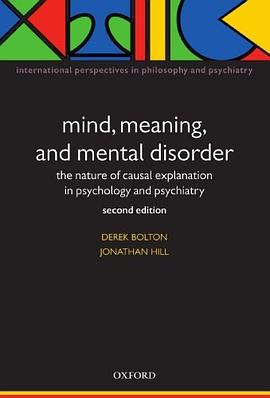

具体描述
If people change radically as a result of mental disturbance or brain damage or disease, how should we acknowledge that change in the way in which we respond to them? And how should society and the law acknowledge that change, particularly in cases of multiple-personality and manic-depressive disorders? This book addresses these and a cluster of other questions about changes in the self through time and about the moral attitudes we adopt in the face of these changes. The result is a broad-ranging interdisciplinary discussion at the boundaries of psychiatry, philosophy, law, and social policy. Theories of personal identity are applied to, and clarified in light of, the appearance of multiple selves in a variety of personality and identity disturbances.Divided minds force us to clarify our thinking about human subjectivity, Radden points out, and when they result in a succession of "selves," they provoke interesting ethical and legal issues. Radden provides a clear and thorough discussion of basic issues faced by clinicians and philosophers contending with the unity of consciousness and personal identity, particularly in the area of dissociative disorders, where issues of unity of consciousness have a direct impact on clinical and forensic decisions.Part 1 takes up the divisions and heterogeneities associated first with the normal self and then with the pathological self and identifies a "language of successive selves." Part 2 provides an extended analysis of personal responsibility and culpability with regard to extreme multiplicity. Part 3 takes up the notion of a metaphysics of successive selves. And part 4 addresses theoretical concerns associated with clinical material in an effort to further our understanding of the concepts of self-consciousness and subjectivity.A Bradford Book
作者简介
目录信息
读后感
评分
评分
评分
评分
用户评价
这本书的名字《Divided Minds and Successive Selves》精准地抓住了我一直以来对“自我”这个概念的困惑。我常常会觉得自己好像是一个被分割成不同部分的集合体,在不同的时间、不同的场合,会展现出完全不同的情绪和行为。有时我对自己感到满意,觉得自己的思维清晰、目标明确;但有时我又会陷入自我怀疑,觉得自己过去的决定是如此幼稚可笑,仿佛那不是同一个我。这本书的出现,仿佛是对我内心这种体验的一种回应和解释。我期待作者能够深入探讨是什么原因导致了这种“分裂”,是童年的经历?是社会环境的压力?还是我们自身大脑的运作机制?而“连续的自我”这个概念,则是我最期待的解答。它是否意味着即使我们经历了巨大的变化,或者犯下了不可饶恕的错误,我们依然能够找回一种贯穿始终的自我认同?我希望这本书能够提供一种积极的视角,让我理解这种“分裂”是生命体验的一部分,而不是一种缺陷。
评分当我看到《Divided Minds and Successive Selves》这个书名时,我立刻被它所传达的深度和广度所吸引。我一直认为,人类的自我并非是一个单一、不变的实体,而是随着时间、经历和环境的变化而不断演变的。这本书似乎正是围绕着这一核心理念展开。我迫不及待地想知道,作者将如何描绘这种“分裂的心智”——是因为我们扮演着不同的社会角色?是因为我们内心存在着潜意识的冲动?还是因为我们对过去和未来的认知会影响当下的自我?而“连续的自我”这个词组,则为我提供了一种希望,它暗示着即使存在分裂,我们也能够找到一种内在的联系,使得我们的生命体验能够形成一个有机整体。我期待这本书能够提供一些哲学上的思考,也希望能看到一些心理学上的证据来支持这些观点。这本书是否会探讨创伤如何影响我们的自我认知?或者,它是否会提供一些方法,让我们能够更好地整合那些看似矛盾的自我面向?
评分《Divided Minds and Successive Selves》这本书的标题本身就足够吸引我了。它触及了许多我一直在思考却无法清晰表达的问题。我常常会感到,自己好像同时存在着很多个“我”,一个理想中的我,一个别人眼中的我,还有一个我自己可能都还不完全认识的我。这本书的“分裂的心智”部分,我猜测会深入探讨这些不同面向是如何形成的,它们之间又存在怎样的张力。而“连续的自我”则让我看到了一个更令人兴奋的可能性——即便我们并非单一的个体,我们依然能够拥有一种贯穿生命始终的自我认同。我希望这本书能够提供一种更具建设性的视角,让我能够理解并接纳自己内心的复杂性,而不是因为这些“分裂”而感到焦虑或不安。它是否会提供一些案例,来说明那些经历过重大转变的人们,是如何维持他们的自我连续性的?抑或是,它将从认知科学的角度,解释大脑是如何在时间流逝中构建我们对“自我”的感知?
评分《Divided Minds and Successive Selves》给我最深刻的感受是,它让我看到了自我认知的一种更动态、更具弹性的视角。我之前读过一些关于自我同一性的书籍,但它们往往侧重于描述一个相对静态的“核心自我”。这本书则大胆地挑战了这一观点,它深入剖析了我们内心存在的各种“分裂”,比如我们作为学生、作为子女、作为伴侣、作为职场人士时所展现出的不同面向。作者用生动的例子和严谨的论述,说明了这些“分裂”并非相互排斥,而是共同构成了我们复杂而多维的身份。更让我着迷的是,书中对“连续的自我”的探讨,它不是在否定这些分裂,而是在寻找一种将它们整合起来的可能性。这让我意识到,即使我们在不同的情境下表现出不同的行为和思维方式,我们依然可以通过某种内在的连续性来维系我们的身份。这本书不仅提供了理论上的框架,更重要的是,它提供了一种实用性的视角,让我能够更好地理解和接纳自己,以及身边的人。
评分这本书的标题《Divided Minds and Successive Selves》在第一时间就击中了我的兴趣点,因为我长期以来都对个体心理的复杂性,以及我们在不同人生阶段身份的演变深感兴趣。我一直很好奇,究竟是什么让我们在面对不同的人和事时,会展现出截然不同的行为模式和思维方式?是环境的改变,还是我们内在心理机制的调整?而“连续的自我”这一说法,更是让我看到了一个可能性,即在所有这些看似分散的“我”的背后,可能存在着某种统一的线索。我迫切地想知道,作者将如何拆解“分裂的心智”,是否会运用心理分析、神经科学,甚至是哲学上的观点来阐述。我希望这本书能够提供一种清晰的框架,帮助我理解这些内在的分裂并非是令人担忧的缺陷,而是我们作为个体不断适应和成长的必然结果。同时,我也期待它能为我提供一些关于如何在不断变化的生活中,找到并维系一种内在的自我连续性的方法。
评分这本书的名字《Divided Minds and Successive Selves》一开始就勾起了我的好奇心。我一直对心理学和哲学交叉的领域很感兴趣,尤其是那些探讨人类意识、自我认知以及时间流逝中个体身份变化的书籍。这本书的标题暗示了一种对我们内心世界复杂性的深入挖掘,它挑战了我们对“单一”或“固定”自我的传统观念。我想象着作者会如何拆解“分裂的心智”,也许是通过分析不同情境下我们表现出的不同面向,又或是探讨我们内心深处存在的矛盾与冲突。同时,“连续的自我”这个词组则为我们提供了一种可能的出路,它暗示了即使存在分裂,我们也能够找到一条线索,将这些碎片化的体验编织成一个连贯的生命故事。我期待这本书能够提供一些深刻的洞见,帮助我更好地理解自己,以及我们如何在不断变化的世界中保持一种相对稳定的身份认同。这本书是否会涉及认知失调,或者弗洛伊德的潜意识理论?它会以案例研究为主,还是理论推演?这些都是我非常期待在书中找到答案的问题。我希望作者能够以一种引人入胜的方式呈现这些复杂的概念,让即使是初学者也能从中获益。
评分这本书的名称《Divided Minds and Successive Selves》在我看来,就是对人类最本质的困惑之一的精准描绘。我一直好奇,是什么让我们在不同的年纪、不同的经历下,感觉自己像是“不同的人”?为什么我们有时候会对自己过去的某个决定感到陌生,仿佛那是别人做出的选择?“分裂的心智”这个概念,我猜想会深入挖掘我们内在的矛盾、冲动以及不同自我原型之间的互动。是我们的认知偏差,还是环境的迫使,亦或是我们内在的心理防御机制,导致了这种“分裂”?而“连续的自我”,则是我对这本书最期待的部分。它是否会告诉我,即便我们经历了人生的跌宕起伏,即便是我们的观点和价值观发生了巨大的变化,我们依然能够找到一种内在的连续性,将这些碎片化的自我连接起来?我希望这本书能够提供一种深刻的哲学反思,让我能够更清晰地认识到,自我并非是一个静止的标签,而是一个动态的、不断被创造和重塑的过程。
评分《Divided Minds and Successive Selves》是一本真正能够颠覆我固有认知的好书。它没有提供那些空洞的励志口号,而是以一种深刻且细致的笔触,剖析了人类心智的复杂结构。我曾经以为,我们应该努力成为一个“完整”且“统一”的个体,但这本书告诉我,这种追求可能是一种误导。作者通过对“分裂的心智”的深入探讨,让我理解到,我们内心存在的各种矛盾、对立甚至是我们不愿承认的面向,都构成了真实的我们。它们不是需要被压抑或消除的,而是需要被理解和整合的。而“连续的自我”的概念,则为我们提供了一种超越这些分裂的可能性。它不是要我们抹杀个体的差异和变化,而是在承认这些变化的同时,找到一种能够将过去、现在和未来联系起来的叙事。这本书让我对“成长”有了新的定义,它不再仅仅是技能的提升或知识的积累,而更是一种对自我复杂性的接纳和对生命过程的理解。
评分《Divided Minds and Successive Selves》这本书带给我的最核心的启发,在于它打破了我对“同一性”的僵化理解。我过去习惯于认为,我们就是一个恒定不变的个体,就像一块刻着名字的石头。但这本书却像一位经验丰富的导游,带领我走进一座复杂的心灵迷宫,让我认识到“自我”的流动性和多变性。作者细腻地描绘了我们内心存在的种种“分裂”——那些我们自己可能都没有意识到的矛盾、冲突以及不同角色的切换。它们并非是病态的,而是生命本身复杂性的体现。更令人欣喜的是,书中对“连续的自我”的探索,它不是要我们抹杀这些“分裂”,而是寻找一种线索,将这些看似分散的经验和感受串联起来,形成一个连贯的生命叙事。我尤其被书中关于记忆和时间如何影响我们自我认知的论述所吸引。它让我开始反思,那些我们认为“真实”的过往,在多大程度上是我们当下自我构建的结果。
评分读完《Divided Minds and Successive Selves》后,我发现自己对“我是谁”这个问题有了全新的思考角度。书中并没有简单地告诉你一个固定的答案,而是引导你踏上一次探索自我旅程。作者以一种非常流畅且充满启发性的方式,将那些看似难以捉摸的心理学和哲学概念变得触手可及。我尤其喜欢书中对“连续的自我”的论述,它打破了我过去那种认为自我是一个永恒不变的实体的想法。相反,我开始认识到,我们的自我更像是一条河流,虽然河水不断流动,但我们依然能辨认出这是同一条河流。这种“流动中的固定”的概念,让我对人生中的变化和成长有了更积极的看法。书中的某些章节,尤其是关于童年经历如何塑造成年自我,以及我们如何在不同人生阶段做出身份认同的调整,都让我感触颇深。我曾一度困惑于某些旧习惯的难以改变,以及为何在面对新的环境时,自己会展现出截然不同的行为模式。这本书就像一把钥匙,帮助我解锁了这些困惑,让我理解到这些“分裂”并非病态,而是人类心智运作的自然体现。
评分 评分 评分 评分 评分相关图书
本站所有内容均为互联网搜索引擎提供的公开搜索信息,本站不存储任何数据与内容,任何内容与数据均与本站无关,如有需要请联系相关搜索引擎包括但不限于百度,google,bing,sogou 等
© 2026 book.wenda123.org All Rights Reserved. 图书目录大全 版权所有




















